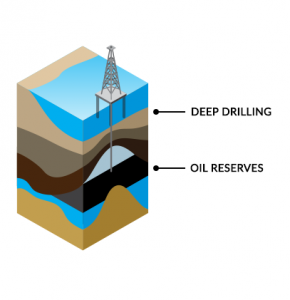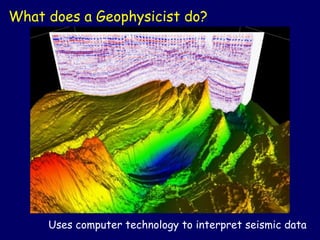All Categories
Featured
Table of Contents
Working As A Geophysicist And Oceanographer In Canada in Wandi Australia 2021

Other possible geophysicist majors that aren't geophysics or geoscience include: Climatic sciences and meteorology Chemical and physical oceanography Earth science Environmental science Hydrology and water resources science Products science By making any geophysicist degree, and by taking the essential geology courses, you need to get approved for an entry-level position as a geoscientist or geophysicist.
Eventually, students need to learn: a branch of geology that looks at the various aspects of minerals, including chemical composition, internal crystal structure, and physical homes. the study of rocks and the procedures and conditions that form and change them in time. There are a few neighborhoods in this branch of geology, consisting of igneous, metamorphic, and sedimentary rocks.

This field examines structural rock features such as cleavage, faults, joints, and little folds. They should likewise find out the computer system skills required to: evaluate data develop digital models and maps operate geoscientists' software Students need to also benefit from all opportunities to gain real-world experience. Ambitious geophysicists ought to anticipate to hang around knowing: in the classroom in the field in labs Obviously, abilities taught in the classroom are really essential for striving geophysicists.
Environmental Geophysicist in Kallaroo Oz 2023
For instance, geoscientists spend a lot of their time outside when operating in the field, so they need to have "outside skills" like camping and running boats, aircraft, and other automobiles. Due to the fact that they spend a lot time in remote areas, it's vital that geophysicists also have the physical endurance to bring necessary equipment on their hikes to areas of research study.
The task provides: a high mean and top incomes a high rate of individual complete satisfaction among geophysicists low work stress positive job outlook More info on incomes capacity and job outlook is detailed below. For trainees seeking to land an entry-level function as a geoscientist or geophysicist, it takes four years, or the time required to finish a bachelor's degree in geophysics or an associated discipline.
Some research positions in geophysics need doctoral degrees. If you prepare to teach at a college or university, you should earn a Ph. D. in geophysics or an associated field. The time it requires to earn a Ph. D. differs by institution and program, however it typically takes 4 to six years beyond the bachelor's degree.
What Should I Do To Be A Geophysicist? in Winthrop Western Australia 2020
Most companies require candidates to have a bachelor's degree in geophysics or a closely associated discipline for all entry-level positions. As a result, there's no way around the degree requirements for becoming a geophysicist.
Presently, 31 states need licensing for geologists, although licensing is not constantly needed, particularly for entry-level work. The states that do concern licenses utilize the Basics of Geology Exam (FGE), which is administered through the National Association of State Boards of Geology (ASBOG). Now that you understand which degree for geophysicist tasks you require, you'll need to land a task, and it's crucial to learn how much money you can make in this profession.
According to BLS, the typical annual wage for geoscientists is $93,580. According to BLS, certain industries use greater wages for geoscientists, and in some cases, they provide higher-than-average earnings.
Geophysical Surveys in Applecross Australia 2023
In reality, mining, quarrying, and oil and gas extraction provides over $32,000 more every year than the average yearly wage for this profession. The federal government, too, provides over $10,000 more in incomes than the nationwide average for geoscientists. In addition to market type, geographical place can significantly impact incomes for this profession.

The top-paying states and their annual mean wages, according to the BLS, consist of: Texas $166,720 Oklahoma $149,630 Pennsylvania $120,590 Hawaii $120,130 Colorado $107,260 These 5 top-paying states offer much higher salaries than the average for this profession. In reality, incomes for geoscientists in Texas are over $73,000 higher than the nationwide average.
It should come as no surprise that the majority of these high-paying locations remain in Texas and Oklahoma, however some are found in California, Louisiana, and Colorado. The leading 10 highest-paying city locations for geoscientists are: Houston-The Woodlands-Sugar Land, Texas: $188,400 Tulsa, Oklahoma: $186,490 Midland, Texas: $167,040 Odessa, Texas: $147,080 Oklahoma City, Oklahoma: $145,350 Bakersfield, California: $130,080 Urban Honolulu, Hawaii: $124,470 New Orleans-Metairie, Louisiana: $121,030 Washington-Arlington-Alexandria, DC, VA, MD, WV: $120,180 Denver-Aurora-Lakewood, Colorado: $116,910 For some geoscientists and geophysicists, residing in a metro city is not as enticing as residing in a smaller sized community.
Latest Posts
Geophysical Survey - Salisbury Archaeology in South Guildford Aus 2021
Geophysical Survey in Yangebup Aus 2022
Working As A Geophysicist And Oceanographer In Canada in Singleton Aus 2022